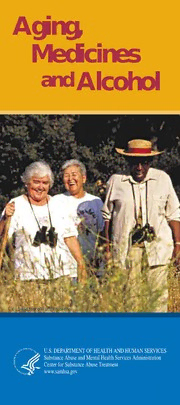
Aging, Medicines, and Alcohol PDF
Preview Aging, Medicines, and Alcohol
Aging, Medicines and Alcohol © David Young-Wolff/ Photodisc U.S. DEPARTMENT OF HEALTH AND HUMAN SERVICES Substance Abuse and Mental Health Services Administration Center for Substance Abuse Treatment www.samhsa.gov As you get older, it’s important to take care of your health. © Paul Conklin/Photodisc As we age, the need to take more, and different kinds of medication tends to increase. Also, growing older means that our bodies respond differently to alcohol and to medication than when we were younger. You should be aware that: • Some of your medicines won’t mix well with other medications, including over-the-counter medications and herbal remedies. • Many medications do not mix well with alcohol. 1 2 Because medicine and alcohol misuse can happen unintentionally, it’s important to know if you’re having a problem. Here are some signals that may indicate an alcohol or medication-related problem: • Memory trouble after having a • Changes in eating habits drink or taking medicine • Wanting to stay alone a lot • Loss of coordination (walking of the time unsteadily, frequent falls) • Failing to bathe or keep clean • Changes in sleeping habits • Having trouble finishing sentences • Unexplained bruises • Having trouble concentrating • Being unsure of yourself • Difficulty staying in touch • Irritability, sadness, depression with family or friends • Unexplained chronic pain • Lack of interest in usual activities 3 4 Do you think you may be having trouble with alcohol or medications? Do you want to avoid a problem? Here are some things you can do: Talk to someone you trust: • Talk with your doctor or other health care professional. They can check for any problems you may be having,and can discuss treatment options with you. • Ask for advice from a staff member at a senior center or other program in which you participate. • Share your concerns with a friend, family member or spiritual advisor. Take steps on your own: Share the right information with your health care professional: • Read the labels of your medications carefully and follow the directions. • Make a list for your doctor of all your • Look for pictures or statements on your medications (including doses),especially prescriptions and pill bottles that tell on your first visit. Keep it updated,and you not to drink alcohol while taking carry it with you. the particular medicine.If you are • Remind your doctor or pharmacist about taking medication for sleeping,pain, any previous conditions that might affect anxiety,or depression,it is unsafe to your ability to take certain medicines,such drink alcohol. as a stroke,hypertension,serious heart • If you have never been diagnosed with a disease,liver problems or lung disease. drinking problem,one alcoholic drink a • Don’t be afraid to ask questions if you day is the recommended limit for don’t know the meaning of a word,if anyone over the age of 65. That's 12 instructions are unclear,or if you want ounces of beer,1.5 ounces of distilled more information. spirits or 5 ounces of wine. • Whenever possible,have your doctor or a member of the medical staff give you written advice or instructions. 5 6 If you want to talk to a qualified care professional about alcohol and medications,a 24-hour hotline is available: 1-800-662-HELP (4357) or visit www.findtreatment.samhsa.gov Check the box below to see if a local program or provider has listed its address and/or phone number. For Health Care Professionals: Do not reproduce or distribute this publication for a fee without specific,written authorization from the Office of Communications, Substance Abuse and Mental Health Services Administration,U.S. Department of Health and Human Services. This brochure was created to accompany the publication Substance Abuse Among Older Adults,#26 in CSAT’s Treatment Improvement Protocol (TIP) series. The TIP series and its affiliated products are available free from SAMHSA’s National Clearinghouse for Alcohol and Drug Information (NCADI). Call 1-800-729-6686 or 1-800-487- 4889 TDD (for the hearing impaired),or visit www.csat.samhsa.gov. DHHS Publication No.[SMA] 02-3619 Printed 2001
